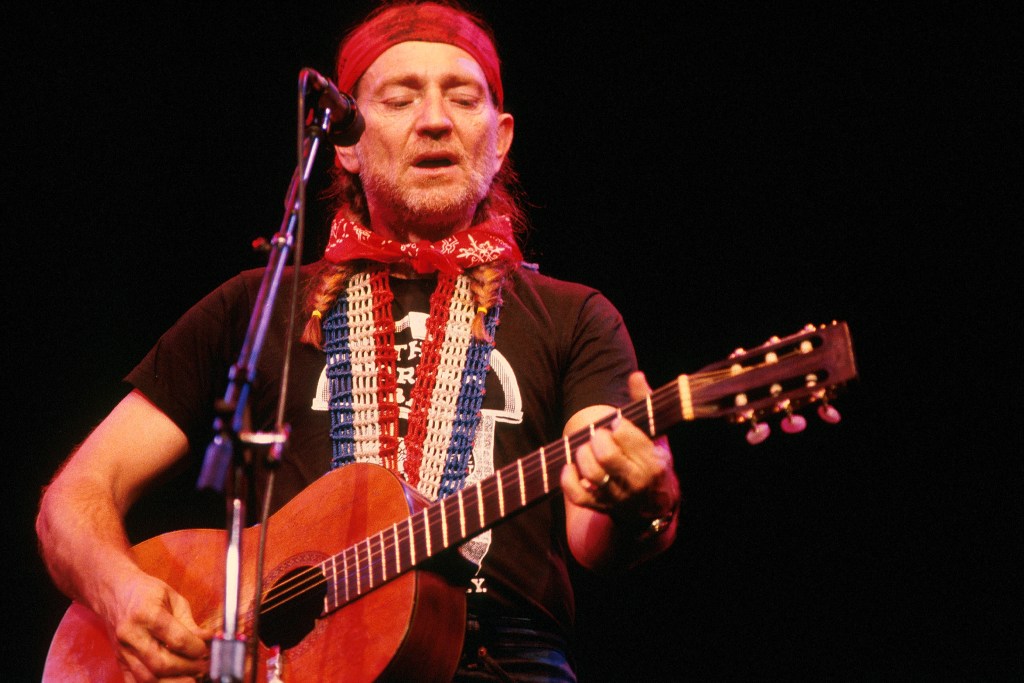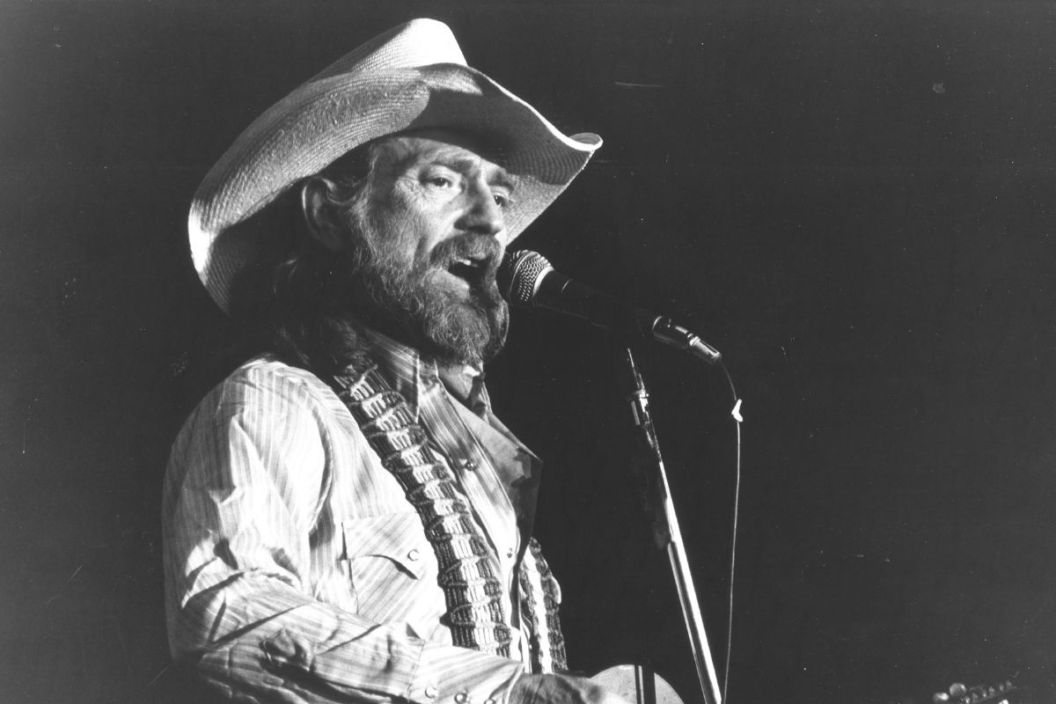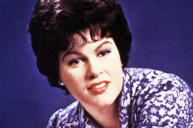We're sharing this article as part of Willie Week, our week-long celebration of the life and music of Willie Nelson ahead of the music icon's 89th birthday on April 29.
Willie Nelson may be a national treasure nowadays, but the long-haired country music outlaw almost called it quits plenty of times. He did call it quits at least once in 1972.
But just a few short years later, a classic country tune ultimately saved his career and launched him into household name status. And ironically enough, it was a song that had already existed for decades.
A Writer Looking to Break Out

FEBRUARY 13: Country singer/songwriter Willie Nelson performs onstage on February 13, 1979. (Photo by Michael Ochs Archives/Getty Images)
Nelson's initial success came almost exclusively as a writer. He'd been on the scene since around 1956, the time of his first recording. But his attempts at being an artist almost always resulted in requiring second jobs and odd arrangements.
Nelson took gigs as a house singer and a radio DJ. He washed dishes and even famously sold encyclopedias — anything to support his music habit, which he continued to feed with off-hand recordings and instructor jobs.
Finally, Nelson decided to spring for Nashville in 1960. He was looking for a receptive audience to his sound. But what he found was a community of songwriters who would befriend him and help further shape his writing.
He eventually signed a publishing deal with Pamper Music, Ray Price's company. The move was a smart one. Not only did he find work touring with Ray Price, but he also found artists who were crazy to record his music. Songs like the appropriately titled "Crazy," which became arguably Patsy Cline's biggest hit.
Not A Fit for the Nashville Sound
But as much success as Nelson found as a writer; he routinely found nothing but rejection when it came to landing his label deal. When he did get them, they didn't stick. Much of Nashville was being swept up in a melodic, pop production style known as the "Nashville Sound." It was created to compete with the pop market, and it worked.
But it didn't work for Nelson, whose unique vocal phrasing made him sound more like a jazz musician than a country star. His vocal was already rough around the edges and preferred a stripped-down sound. Even his versions of his songs — which were hits for other artists — didn't farewell.
But yet, he tried for a full ten years. And they weren't all for naught. During those years, he became a member of the Grand Ole Opry and also befriended some of his legendary cohorts, including Johnny Cash and Waylon Jennings. Retroactively, they may have been some of Nelson's most important years. But if not for uprooting and returning home, he probably never would've hit it big as an artist in the 1970s.
Starting Over

Willie Nelson performs on stage in New York, 1979. (Photo by Michael Putland/Getty Images)
In 1970, Nelson's house in Ridgetop, Tenn. caught fire. He thankfully saved his guitar Trigger, which he bought only a year prior. But he pretty much took it as a sign to return to Texas.
In 1972, the "On The Road Again" singer "retired" from making music in Austin. He was a pretty terrible hog farmer, and he spent nights out on the town checking out the music scene. There, he found rock n' rollers at the honky-tonks and a much more brazen, brash audience welcoming his kind of sound. A few shows out eventually earned him a faithful following.
He signed a deal with Atlantic Records, becoming their first-ever country artist. His album Shotgun Willie was recorded in New York City and earned him critical praise. His 1974 follow-up Phases and Stages built upon that success. But commercially, both albums were pretty much failures.
"Blue Eyes" Catapults Him into Stardom
If Nelson was going to get the kind of fame he wanted as a singer, it needed to happen soon. He was 42 in 1975 and still hadn't had a hit as an artist.
He moved away from Atlantic and found a home at Columbia Records, managing to wrestle creative control away from the label. That may have had to do with his songwriting success, critical praise, and age.
Nelson decided that he wanted to create another concept album (Phases and Stages was also a concept record) with his first release. That didn't thrill Columbia. Neither did the fact that he recorded the album in Garland, Texas, or the fact that when he turned in what became Red Headed Stranger, the label thought the tracks were demos.
But they agreed to release "Blue Eyes Crying In The Rain" as a single, and it pretty much saved Nelson's career as an artist. The song rose to No. 1 on the Billboard charts (on Oct. 5, 1975) and became the third most popular country song of the year by the end of 1975.
Ironically, the song also crossed into the pop realm (something Nashville had been trying to do with Nelson before his departure). It reached No. 21 on the pop chart at the time.
A Familiar Tune
It's hard to say what part of "Blue Eyes" stood out so much in Willie's career. It could have just been perfect timing, after all. But the song struck a chord with people. And it was familiar.
Fred Rose wrote the song, and a handful of country greats took a stab at it. Roy Acuff recorded the song nearly 30 years before Nelson in 1947. Other legendary artists who had their versions before Nelson include Slim Whitman, Faron Young, Hank Williams Sr., and Conway Twitty.
Yet something about Nelson's stripped-down performance captured the song better than any other version. The song uses a standard melody, emphasized by walk-ups and walk-downs laid around a mellow waltz feel. At the time, the second wave of pop-country was in full throttle.
The song solidified Red Headed Stranger as one of the greatest country records ever, and Willie as a household name. The success of the song and album even led to a film adaptation in 1986, starring Nelson, of course. His star only rose from there, all the way to its iconic place in American culture today.
Much has been said of Nelson's time in both Nashville and Texas. A lot of people argue that he's the ultimate example of Nashville trying too hard to force its hand and missing out on genuinely talented artists.
After all, look at how many people Nelson moved with his music once he had full control. But his years in Nashville also helped him forge the friendships that would lead to incredible projects like The Highwaymen. The struggles and growths in those ten years certainly played a part in his subsequent fame.
Either way, none of us would probably be talking about Nelson like the superstar he is if it weren't for his simple little version of a country classic, "Blue Eyes Crying In The Rain."
"Blue Eyes Crying In The Rain" Lyrics:
Blue eyes cryin' in the rain
When we kissed goodbye and parted
I knew we'd never meet again
Only memories remain
Through the ages I'll remember
Blue eyes cryin' in the rain
We'll stroll hand in hand again
In a land that knows no partin'
Blue eyes cryin' in the rain
All my life I've loved in vain
I can see her star in heaven
Blue eyes crying in the rain




